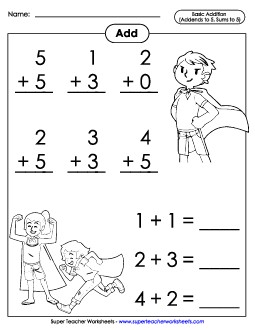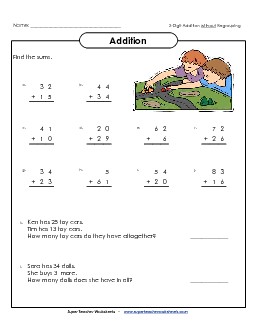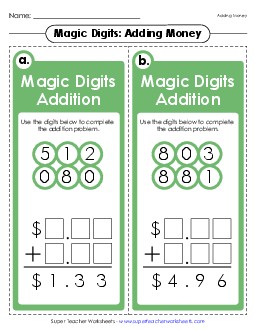Basic Addition Facts

The addition facts on these worksheets have addends up to 5 and sums up to 10. Includes printable worksheets, math puzzles, flashcards, addition card games, and illustrated concept sheets.
(examples: 3+2=5, 1+3=4)
Approx. level: Kindergarten and 1st Grades
Learn basic addition facts with addends up to 10 and sums up to 20. Includes dice games, a bingo game, drill worksheets, number line practice, flash cards, and more.
(examples: 9+8=17, 8+6=14, 7+6=13)
Approx. levels: 1st and 2nd grades
These worksheets and games review basic addition facts that make the number ten.
(examples: 5+5=10, 6+4=10, 7+3=10)
Approx. level: Kindergarten and 1st Grades
This page has basic addition doubles facts. These are facts in which students add a number to itself. This page includes learning centers, flash cards, graphical concept worksheets, printable card games, and mystery pictures.
(examples: 2+2=4, 4+4=8, 8+8=16, 10+10=20)
Approx. level: Kindergarten and 1st Grades
The printables on this page feature basic addition doubles +1 facts. These are math facts in which students double a number, then add one. Includes learning centers, practice worksheets, flash cards, and math sliders.
(examples: 3+4=7, 5+6=11, 7+8=15, 8+9=17)
Approx. level: Kindergarten and 1st Grades
Learn about the relationship between addition and subtraction with these fact family and number bond worksheets.
Approx. levels: 1st and 2nd grades
These practice worksheets feature a mix of basic addition and subtraction facts.
Approx. levels: Kindergarten, 1st grade, 2nd grade
On these printable game sheets, students take turns circling pairs of numbers that add up to a given amount. For example, they might search for pairs of numbers that add up to 16.
Approx. levels: 1st grade, 2nd grade, 3rd grade
Can your students solve these tricky logic puzzles? There are three levels: basic, intermediate, and advanced.
Properties of AdditionLearn about the commutative and associative properties of addition with these printables.
Approx. levels: 3rd, 4th, 5th
(Positive and Negative Numbers)
Practice adding and subtracting positive and negative integers.
2-Digit Addition (No Regrouping)Student will not regroup or carry on these printables with 2-digit addition problems.
Approx. levels: 1st grade, 2nd grade
These two-digit addition worksheets require students to regroup (carry ones). Includes graph paper math, a Scoot! game, task cards, and word problem worksheets.
Approx. levels: 1st grade, 2nd grade
These printable worksheets and games have addition problems with 3-digit addends. Includes math riddles, a magic digit game, math crossword puzzles, and column addition worksheets.
Approx. Level: 2nd grade, 3rd Grade
This page has resources for teaching addition with 4-digit addends. Activities on this page include: column addition exercises, an addition crossword, task cards, and word problems.
Approx. level: 3rd grade, 4th grade
Use these printable resources to learn, review, and practice addition with 5-digit addends.
Approx. level: 4th grade, 5th grade
When you print these activities, you'll notice that the problems have 3, 4, or 5 addends. Includes 1, 2, 3, and 4-digit numbers.
Adding 10 and Multiples of 10This page has task cards and worksheets for teaching students to add 10 or a multiple of 10 to any 2-digit number.
Fraction AdditionOn these worksheets, students will practice adding fractions and mixed numbers. Includes fractions with same denominator and different denominators.
Approx. levels: 3rd, 4th, 5th, and 6th grades
Find sums and differences for pairs of decimals on these worksheets. These practice pages have decimals in tenths, hundredths, and thousandths.
Money AdditionThese printables have horizontal and vertical money addition problems, as well as word problems.
Math Riddle WorksheetsThere are many addition worksheets on our Math Riddle page too. On these sheets, students can decode the answer to a funny riddle by completing arithmetic problems.
Math Mystery PicturesThis section of the site links to many basic, single-digit addition worksheets. Students solve addition problems, then color the mystery picture according to the color-coded key at the bottom of the page.
Multiple Step Word ProblemsStudents use addition, subtraction, multiplication, and/or division to solve these multi-step math word problems.
Using Number LinesLearn to add and subtract with number lines.



Basic addition is one of the most foundational skills taught in elementary school math. Usually introduced in kindergarten and further developed in first and second grades, learning how to add is essential for young students as it lays the groundwork for virtually every other math concept they will encounter. Addition involves combining two or more numbers to find a total, and it is a crucial stepping stone toward more advanced arithmetic like subtraction, multiplication, and division. Mastery of basic addition not only builds math proficiency but also helps develop logical thinking and problem-solving skills in young learners.
In the classroom, teachers use a variety of methods to help students grasp the concept of addition. Visual aids, such as counting blocks, number lines, and ten frames, allow children to see how numbers combine to form sums. Interactive games, flashcards, and group activities also make practicing addition more engaging, reinforcing the skill through repetition and fun. Additionally, teachers may use real-world scenarios, like counting objects or solving simple word problems, to show students how addition is used in everyday life. These teaching methods are designed to be age-appropriate, ensuring that students can build their understanding step by step.
Understanding basic addition is crucial for success in later grades, as it forms the basis for more complex math operations. Without a solid grasp of addition, students may struggle with more advanced topics such as algebra, geometry, and beyond. Moreover, addition is used daily, from simple tasks like counting money to calculating time and distances. By ensuring that students have a strong foundation in basic addition, teachers are setting them up for future success both academically and in practical, real-world situations. You can count on Super Teacher Worksheets for educational material to help teach every aspect of addition!






